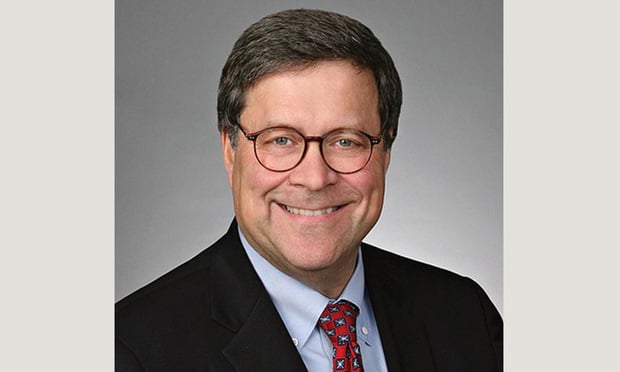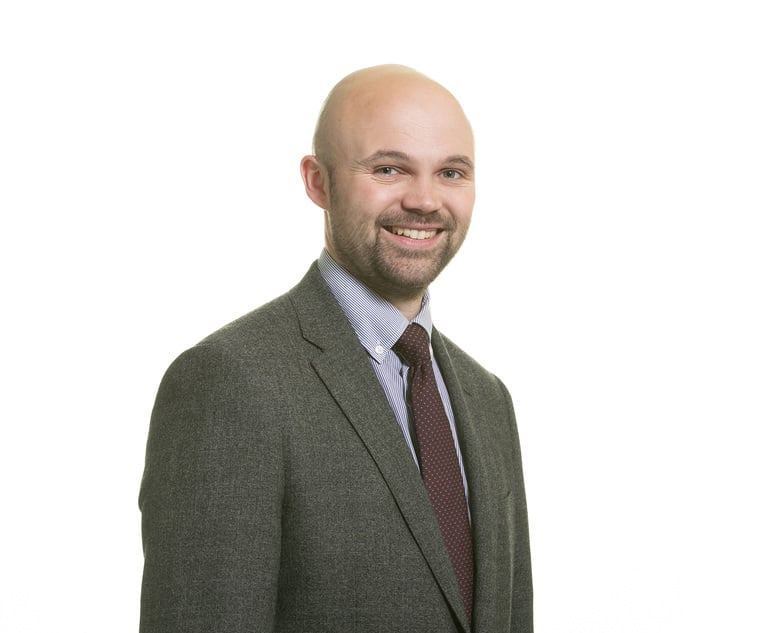Trump Taps Kirkland & Ellis' William Barr to Replace Jeff Sessions
Barr, who was a U.S. attorney general under President George H.W. Bush, currently serves as of counsel at Kirkland & Ellis.
December 07, 2018 at 10:29 AM
4 minute read
The original version of this story was published on National Law Journal
 William Barr (Courtesy photo).
William Barr (Courtesy photo).
William Barr, the conservative Washington, D.C., attorney who headed the Justice Department in the early 1990s, will be President Donald Trump's pick for U.S. attorney general.
The president made the announcement in comments to the press Friday morning. Barr, who was a former U.S. attorney general under President George H.W. Bush, currently serves as of counsel at Kirkland & Ellis. He will be tapped once again to head the Justice Department in a fraught time for the agency, which oversees special counsel Robert Mueller III's probe into Russian interference in the 2016 U.S. presidential election.
Trump said he hopes the confirmation process moves quickly.
“I've seen very good things about him even over the last day or so when people thought it might be Bill Barr,” Trump said.
If he is confirmed, Barr will replace acting Attorney General Matthew Whitaker, whose own installation atop the Justice Department has generated much controversy and is currently the subject of litigation. Barr's nomination would have to be confirmed by the U.S. Senate, which could take months.
Before Barr served as attorney general, he was in the No. 2 spot as deputy attorney general and also headed the DOJ's Office of Legal Counsel. Here are some other things to know about Barr:
He has served as of counsel at Kirkland since 2017. Since he left the Justice Department in the early '90s, Barr has moved around the private sector, serving in top roles for corporations and law firms. In 1994, upon leaving the DOJ, he worked as general counsel for GTE Corp., the telephone giant that merged with Bell Atlantic to form Verizon in 2000. Barr served as Verizon's general counsel until late 2008, when he left for a brief stint at Kirkland & Ellis in 2009. Shortly after, he was named to Time Warner Inc.'s board of directors. Barr rejoined Kirkland in 2017, where he has advised major companies like Caterpillar.
He was a big fan of the previous occupant of the AG office. In a recent Washington Post column with two other former U.S. attorneys general, Barr praised former AG Jeff Sessions' tenure at DOJ. Sessions resigned from his role in November under pressure from the Trump White House. Writing with former AGs Ed Meese and Michael Mukasey, Barr praised Sessions' handling of controversial issues like law enforcement and immigration. On the topic of law enforcement's relationship with African-Americans, the op-ed authors criticized the Obama administration, writing that it had “undermined police morale, with the spreading 'Ferguson effect' causing officers to shy away from proactive policing out of fear of prosecution.”
Barr opposed one of the Justice Department's biggest actions last year: Its antitrust lawsuit to block the AT&T and Time Warner merger. Court filings show that Barr, as a Time Warner board member, attended a November 2017 meeting with Justice Department officials who were preparing a legal challenge to the merger. Later, as the legal fight brewed in Washington, D.C., federal court, Barr wrote a declaration about that meeting, disputing the Justice Department's claims that Paul Cappuccio, Time Warner's lawyer, had threatened retaliation against Makan Delrahim, the Justice Department's top antitrust official. “No reasonable person could have misinterpreted Mr. Cappuccio's comments as a threat that the companies would personally attack Mr. Delrahim or anyone else in the event of litigation,” Barr said in his declaration. If Barr is confirmed as the AG, he would be Delrahim's boss.
Barr has sounded off on the Mueller probe, as well other controversial but cornerstone issues for the Trump administration. Speaking to the New York Times in November 2017, Barr weighed in on the president's calls to investigate his political rival, former Secretary of State Hillary Clinton. “There is nothing inherently wrong about a president calling for an investigation,” he said, adding: “Although an investigation shouldn't be launched just because a president wants it, the ultimate question is whether the matter warrants investigation.” Barr, according to the Times, said there was more of a basis for the Justice Department to probe the Uranium One deal, a cause célèbre for anti-Clinton conservatives, than for its investigation of any possible links between the Trump campaign and Russia. “To the extent it is not pursuing these matters, the department is abdicating its responsibility,” he told the Times.
Read more:
Justice Department's Push to Revive AT&T Case Hits Skeptical DC Circuit Panel
Williams & Connolly Chair Dane Butswinkas Is Named Tesla General Counsel
This content has been archived. It is available through our partners, LexisNexis® and Bloomberg Law.
To view this content, please continue to their sites.
Not a Lexis Subscriber?
Subscribe Now
Not a Bloomberg Law Subscriber?
Subscribe Now
NOT FOR REPRINT
© 2025 ALM Global, LLC, All Rights Reserved. Request academic re-use from www.copyright.com. All other uses, submit a request to [email protected]. For more information visit Asset & Logo Licensing.
You Might Like
View All
Government Attorneys Face Reassignment, Rescinded Job Offers in First Days of Trump Administration
4 minute read


Trending Stories
- 1We the People?
- 2New York-Based Skadden Team Joins White & Case Group in Mexico City for Citigroup Demerger
- 3No Two Wildfires Alike: Lawyers Take Different Legal Strategies in California
- 4Poop-Themed Dog Toy OK as Parody, but Still Tarnished Jack Daniel’s Brand, Court Says
- 5Meet the New President of NY's Association of Trial Court Jurists
Who Got The Work
J. Brugh Lower of Gibbons has entered an appearance for industrial equipment supplier Devco Corporation in a pending trademark infringement lawsuit. The suit, accusing the defendant of selling knock-off Graco products, was filed Dec. 18 in New Jersey District Court by Rivkin Radler on behalf of Graco Inc. and Graco Minnesota. The case, assigned to U.S. District Judge Zahid N. Quraishi, is 3:24-cv-11294, Graco Inc. et al v. Devco Corporation.
Who Got The Work
Rebecca Maller-Stein and Kent A. Yalowitz of Arnold & Porter Kaye Scholer have entered their appearances for Hanaco Venture Capital and its executives, Lior Prosor and David Frankel, in a pending securities lawsuit. The action, filed on Dec. 24 in New York Southern District Court by Zell, Aron & Co. on behalf of Goldeneye Advisors, accuses the defendants of negligently and fraudulently managing the plaintiff's $1 million investment. The case, assigned to U.S. District Judge Vernon S. Broderick, is 1:24-cv-09918, Goldeneye Advisors, LLC v. Hanaco Venture Capital, Ltd. et al.
Who Got The Work
Attorneys from A&O Shearman has stepped in as defense counsel for Toronto-Dominion Bank and other defendants in a pending securities class action. The suit, filed Dec. 11 in New York Southern District Court by Bleichmar Fonti & Auld, accuses the defendants of concealing the bank's 'pervasive' deficiencies in regards to its compliance with the Bank Secrecy Act and the quality of its anti-money laundering controls. The case, assigned to U.S. District Judge Arun Subramanian, is 1:24-cv-09445, Gonzalez v. The Toronto-Dominion Bank et al.
Who Got The Work
Crown Castle International, a Pennsylvania company providing shared communications infrastructure, has turned to Luke D. Wolf of Gordon Rees Scully Mansukhani to fend off a pending breach-of-contract lawsuit. The court action, filed Nov. 25 in Michigan Eastern District Court by Hooper Hathaway PC on behalf of The Town Residences LLC, accuses Crown Castle of failing to transfer approximately $30,000 in utility payments from T-Mobile in breach of a roof-top lease and assignment agreement. The case, assigned to U.S. District Judge Susan K. Declercq, is 2:24-cv-13131, The Town Residences LLC v. T-Mobile US, Inc. et al.
Who Got The Work
Wilfred P. Coronato and Daniel M. Schwartz of McCarter & English have stepped in as defense counsel to Electrolux Home Products Inc. in a pending product liability lawsuit. The court action, filed Nov. 26 in New York Eastern District Court by Poulos Lopiccolo PC and Nagel Rice LLP on behalf of David Stern, alleges that the defendant's refrigerators’ drawers and shelving repeatedly break and fall apart within months after purchase. The case, assigned to U.S. District Judge Joan M. Azrack, is 2:24-cv-08204, Stern v. Electrolux Home Products, Inc.
Featured Firms
Law Offices of Gary Martin Hays & Associates, P.C.
(470) 294-1674
Law Offices of Mark E. Salomone
(857) 444-6468
Smith & Hassler
(713) 739-1250










